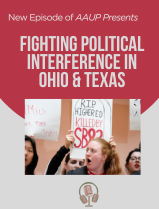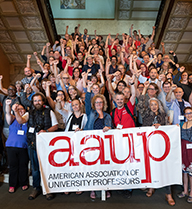Registration is now open for the 2024 AAUP Conference and Biennial Meeting! Sign up now and get early bird registration rates until April 27.
- About
- Programs
- Resources
- For AFT Higher Ed Members
- Academic Freedom
- Shared Governance
- Political Interference in Higher Ed
- Racial Justice
- Diversity in Higher Ed
- Responding to Financial Crisis
- Privatization and OPMs
- COVID-19 Pandemic
- Contingent Faculty Positions
- Tenure
- Workplace Issues
- Gender and Sexuality in Higher Ed
- Targeted Harassment
- Intellectual Property & Copyright
- Free Speech on Campus
- Civility
- Publications
- Data
- News
- Membership
- Chapters








